|
|
|
Sort Order |
|
|
|
Items / Page
|
|
|
|
|
|
|
| Srl | Item |
| 1 |
ID:
097502


|
|
|
|
|
| Publication |
2010.
|
| Summary/Abstract |
This short communication examines whether or not U.S. natural gas consumption follows a stationary process. Unlike previous research that has focused on regional country or industrial sector-based panel studies, this study undertakes a sub-national investigation of natural gas consumption for the 50 U.S. states. Levin et al. (2002), Im et al. (2003), Maddala and Wu (1999), and Hadri (2000) panel unit root and stationarity tests reveal that natural gas consumption is integrated of order one. However, once allowance is made for endogenously determined structural breaks, the Carrion-i-Silvestre et al. (2005), Im et al. (2005), and Westerlund (2005) panel unit root and stationarity tests indicate that natural gas consumption is integrated of order zero. Discussion of the structural breaks is briefly surveyed in relation to the natural gas industry's response to legislative actions.
|
|
|
|
|
|
|
|
|
|
|
|
|
|
|
|
| 2 |
ID:
116414


|
|
|
| 3 |
ID:
180119
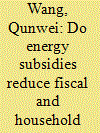

|
|
|
|
|
| Summary/Abstract |
In China, central, provincial, and prefecture-level governments have issued coal-to-gas subsidies to households since 2017, with the goal of encouraging the transition of residential heating energy from coal to natural gas. This study responds to the resulting public concerns that coal-to-gas subsidies reduce fiscal and household non-energy expenditures. To be specific, we measured the reductions in fiscal non-energy expenditures created by superior governmental subsidies (SGS) and local governmental subsidies (LGS). For households, we examined whether device subsidies (DS) and consumption subsidies (CS) encourage natural gas consumption, and thereby reduce household non-energy expenditures. A regional heterogeneity analysis was conducted to assess these subsidies. We found that reductions in fiscal and household non-energy expenditures mainly occur in cities with a higher proportion of natural gas in household energy consumption, and are induced by LGS and DS, respectively. SGS and CS are essential to remedy the fiscal and household reductions, respectively. Subsidies perform best in highly air-polluted cities, where CS encourage natural gas consumption without reducing household non-energy expenditures. This study recommends rearranging the coverage of coal-to-gas subsidies, transitioning to regionally differentiated subsidies and management according to city conditions.
|
|
|
|
|
|
|
|
|
|
|
|
|
|
|
|
| 4 |
ID:
117334


|
|
|
|
|
| Publication |
2013.
|
| Summary/Abstract |
The domestic heating sector has a high potential in terms of energy savings and environmental impact. In the present study, an analysis has been carried out on the effect of domestic heating on natural gas (NG) consumption and pollutants emissions. In particular, among various emission pollutants, the nitrogen oxides (NOx) emissions at national level were analyzed in detail. The work was carried out under a collaborative research project between the Italian Ministry of the Environment and Politecnico di Milano.
For the assessment of the national NOx emissions due to residential heating, an inventory of the domestic boilers stock operating in Italy from 1999 to 2010 was made. As from a technological point of view, the precise data about the real composition of national domestic boilers stock were incomplete and not updated, a methodological procedure was developed in order to reconstruct the national domestic boilers stock based on the available technologies and thermal power. According to this scenario, the technological improvement of national boilers stock in the last decade was evaluated in terms of natural gas saving and reduced NOx emissions. Further some discussion has been made on the energy policies for the diffusion of more efficient boilers.
|
|
|
|
|
|
|
|
|
|
|
|
|
|
|
|
| 5 |
ID:
179730
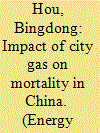

|
|
|
|
|
| Summary/Abstract |
Developing the natural gas industry is considered an effective way to reduce pollution and improve human health. To verify whether the expansion of city gas consumption can effectively decrease mortality rate in China, this study assesses the impact of three different types of city gas on mortality by employing panel data from 30 provinces in China during the period of 2001–2018. Furthermore, the regional difference in the influences of gas consumption on mortality rate is analyzed from the perspective of economic development, spatial distribution, and development of the natural gas industry. The empirical results indicate that the expansion of city gas decreases Chinese mortality rate effectively. Analysis of the impact of different types of gas consumption reveals that a 1% increase in coal gas supply results in boosting mortality by 0.008%. Meanwhile, LPG and natural gas are employed to inhibit mortality. Based on the heterogeneity analysis, the impact of city gas supply on mortality has a scale effect. Finally, policy implications are highlighted for the Chinese government with respect to accelerating the development of the natural gas industry and promoting the building of a healthy China.
|
|
|
|
|
|
|
|
|
|
|
|
|
|
|
|
| 6 |
ID:
132659


|
|
|
|
|
| Publication |
2014.
|
| Summary/Abstract |
We apply a recently developed unit root test that simultaneously accounts for heteroskedasticity and structural breaks to United States monthly natural gas consumption. We find that United States monthly natural gas consumption is stationary. Our results illustrate the importance of accounting for heteroskedasticity when testing for a unit root in energy consumption with higher frequency data.
|
|
|
|
|
|
|
|
|
|
|
|
|
|
|
|
| 7 |
ID:
126544


|
|
|
|
|
| Publication |
2013.
|
| Summary/Abstract |
This paper examines the relationship between natural gas consumption and economic growth in Iran within a multivariate production model. We also investigate the effects of natural gas price on its consumption and economic growth using a demand side model. The paper employs bounds test approach to level relationship over the period of 1972-007. We find evidence of bidirectional positive relationship between natural gas consumption and economic growth in short-run and long-run, based on the production model. The findings also suggest that real GDP growth and natural gas have positive and negative impacts on gross fixed capital formation, respectively. Employment, however, was found to have negative but insignificant impact on gross fixed capital formation. Moreover, the estimation results of demand side model suggest that natural gas price has negative and significant impact on natural gas consumption only in the long-run, though there is insignificant impact on economic growth. These results imply that the Iranian government's decision for natural gas price liberalization has the adverse effects on economic growth and policy makers should be cautious in doing this policy.
|
|
|
|
|
|
|
|
|
|
|
|
|
|
|
|
| 8 |
ID:
132747
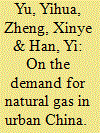

|
|
|
|
|
| Publication |
2014.
|
| Summary/Abstract |
Using a set of unbalanced panel data for Chinese×s cities during the period of 2006-2009, this study aims to estimate the price and income elasticities of residential demand for natural gas. Natural gas consumption is specified as a function of its own price; substitute prices; urban wages; and other supply, climate, and housing characteristics. Using a feasible generalised least squares (FGLS) technique, which controls for panel heteroskedasticity and panel correlation, we find that natural gas consumption is price elastic and income inelastic when other covariates (e.g., the supply of natural gas pipeline and heating degree days) are controlled. In addition, there are large variations in demand behaviours across China×s regions. There is a substantial income effect on demand for natural gas in southern China, whereas the northern regions are found to have a higher price effect. In addition, the substitution effect between coal and natural gas is significant in North China but is not significant in South China. These findings have several important policy implications for natural gas pricing and supply cost analysis in the context of China.
|
|
|
|
|
|
|
|
|
|
|
|
|
|
|
|
| 9 |
ID:
112938


|
|
|
|
|
| Publication |
2012.
|
| Summary/Abstract |
This article re-examines the persistence in natural gas consumption using an alternative methodology. In particular we report estimates of an unobserved components model, in which hysteresis exists if cyclical and natural gas consumptions do not evolve independently. In addition, this framework is also extended by using the nonlinear approach, in which nonlinearities are introduced by allowing past cyclical component to have a different impact on the natural component depending on the regime. In a linear framework our results seem to indicate that hysteresis does not exist. However, when non-linearity is taken into account, we provide evidence in favor of hysteresis in natural gas consumption when the variations in natural gas consumption are above the threshold value. We also selectively survey the empirical literature that examines the long-term properties of energy series in order to put our contribution in perspective.
|
|
|
|
|
|
|
|
|
|
|
|
|
|
|
|
| 10 |
ID:
116706


|
|
|
|
|
| Publication |
2012.
|
| Summary/Abstract |
In recent years there have been several discussions on a greater use of natural gas nationwide. Moreover, there have been several announcements by the private and public sectors regarding the construction of new pipelines to supply natural gas to the Peruvian southern and central-north markets. This paper presents future scenarios for the use of natural gas in the large-sized industrial and commercial sectors of the country based on different hypotheses on developments in the natural gas industry, national economic growth, energy prices, technological changes and investment decisions. First, the paper estimates the market potential and characterizes the energy consumption. Then it makes a selection of technological alternatives for the use of natural gas, and it makes an energetic and economic analysis and economic feasibility. Finally, the potential use of natural gas is calculated through nine different scenarios. The natural gas use in cogeneration systems is presented as an alternative to contribute to the installed power capacity of the country. Considering the introduction of the cogeneration in the optimistic-advanced scenario and assuming that all of their conditions would be put into practice, in 2020, the share of the cogeneration in electricity production in Peru would be 9.9%.
|
|
|
|
|
|
|
|
|
|
|
|
|
|
|
|
| 11 |
ID:
128051


|
|
|
|
|
| Publication |
2014.
|
| Summary/Abstract |
This paper examines the impact of natural gas consumption, real gross fixed capital formation and trade on the real GDP in the case of Tunisia over the period 1980-2010. We use an Autoregressive Distributed Lag (ARDL) bounds testing approach to test for cointegration between the variables. The Toda-Yamamoto approach is then used to test for causality. Our findings indicate the existence of a long-term relationship between the variables. Natural gas consumption, real gross fixed capital formation and trade add in economic growth. Natural gas consumption, real gross fixed capital formation and real trade cause real GDP in Tunisia. These findings open up new insights for policymakers to formulate a comprehensive energy policy to sustain economic growth in the long-term.
|
|
|
|
|
|
|
|
|
|
|
|
|
|
|
|
| 12 |
ID:
166525
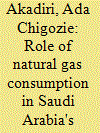

|
|
|
|
|
| Summary/Abstract |
In this paper, we examines the contribution of natural gas consumption in the real GDP of Saudi Arabia using long-span and recent time series data over the period 1968–2016 in a multivariate framework which incorporates total trade as additional variable. By using the Autoregressive Distributed Lag method of cointegration, we find long-run a cointegration equilibrium relationship between NGC, total trade, and real GDP, with a positive significant relationship among the variables. By applying the Toda and Yamamoto method to Granger causality testing, we find a one-sided causality running from NGC to real GDP; while between real GDP and trade, NGC and total trade, total trade and real GDP are without a feedback. From our empirical results, we suggest that natural gas conservation policy would hurt the demand for natural gas, hinder total trade, and thus, retard domestic output. However, in the near future, it is possible for the Saudi Arabian government to meet energy needs and enhance total trade by adopting renewable energy alternatives to natural gas. Results, however, upon which the policy implications are inferred should be applied with caution as they may not be feasible enough to justify the adoption of unappealing energy policy choice for Saudi Arabia.
|
|
|
|
|
|
|
|
|
|
|
|
|
|
|
|
| 13 |
ID:
162926
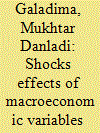

|
|
|
|
|
| Summary/Abstract |
This paper has examined the transmission of shocks from macroeconomic variables, namely money supply, inflation, exchange rate and real GDP onto natural gas consumption using Structural VAR (SVAR) model with sign restrictions. The results revealed that both in the short run and long run, natural gas consumption responds significantly to the shocks emanating from money supply and real GDP while its response to inflation shock is significant only in the short run but exchange rate shock is not significant. However, money supply has contributed greater proportion of the shocks followed by the real GDP, inflation and exchange rate in the ordering of the variance decomposition. The paper recommends that Nigerian authorities adjust the monetary policy tools towards regulating the money supply and checking the inflation rate to ensure increased demand for natural gas and sustained economic growth. On the response of natural gas consumption to the shock in the exchange rate, since the shock is positive though insignificant, it implies that depreciation of the exchange rate can discourage the demand for foreign exchange, imports and, boost the local production which would reciprocally lead to more natural gas consumption and improved growth in the country.
|
|
|
|
|
|
|
|
|
|
|
|
|
|
|
|
|
|
|
|
|